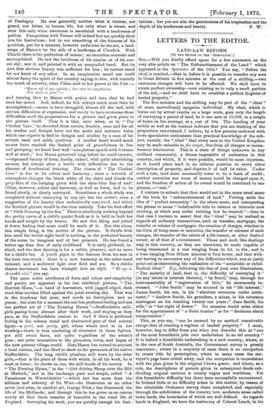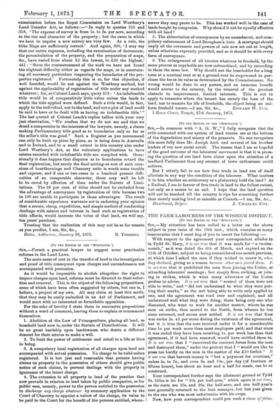LETTERS TO THE EDITOR.
LAND-LAW REFORM.
[TO THR EDITOR OF THR "SPECTATOR."]
SIR,—Will you kindly afford space for a few comments on the- very able article on "The Enfranchisement of the Land" which appeared in the Spectator of the 18th? You say, "Before the
ideal is reached,—that is, before it is possible to transfer any acre in Great Britain in five minutes at the cost of a shilling,—two enormous changes will have to be effected. We shall have to create perfect ownership—now existing as to only a small portion of the soil,—and we shall have to establish a perfect Register of landed property."
The five minutes and the shilling may be part of the " ideal " of some marvellously sanguine individual. My ideal, which is borne out by actual results on a large scale, goes only the length of conveying a parcel of land, be it one acre or 10,000, in a couple of hours on the average, at a cost of 20s. The heading of your article as well as the context indicate that you are treating of the proposition entertained, 1 believe, by a few persons endowed with more speculative enthusiasm than practical knowledge of the sub-
ject, namely, the " ideal " that every acre in the United Kingdom may be made saleable in fee simple, free from all charges or incum- brances whatsoever. This is a state of things unknown in any civilised community, a dream impossible of realisation in this country, and which, if it were possible, would be most injurious, as it would place land in an inferior position to every other description of property, and deprive it of half its value. Under such a rule, land must necessarily cease to be a basis of credit ; neither annuities nor sums of money could be charged upon it, and the freedom of action of its owner would be restricted to one process,—" sale."
I venture to submit that that would not in the more usual sense of the term be "enfranchisement of land." Putting aside the idea of "perfect ownership" in the above sense, and interpreting the phrase to mean "indefeasible title to estates or interests now existing, or which may under existing law be created,"—then in that case I venture to assert that the " ideal " may be realised as regards all ordinary transactions, such as transfer, mortgage, the transfer or release of mortgages, the creation of charges, whether in the form of lump sums or annuities, the transfer or releases of such charges, the transfer of the estate of a life tenant, or other limited owner, or of that of a reversioner. These and such like dealings may in this country, as they are elsewhere, be made capable of being transacted at a cost ranging from 2s. 6d. to 40s., and in a time ranging from fifteen minutes to four hours, and that with- out having to encounter any of the difficulties which you so justly point out as obstructing the realisation of the "socialistic or rabid- Radical ideal." E.g., following the line of your own illustrations, "The security of land, that is, the difficulty of conveying it" (or any estate or interest therein), "by fraud," may, through the instrumentality of "registration of title," be enormously in- creased. "John Smith" may be secured in his "life interest ;" James Smith, his son, in his "absolute reversion under settle- ment ;" "Andrew Smith, his grandson, a minor, in his reversion contingent on his reaching twenty-one years ;" Jane Smith, his wife," in "her right of dower." No occasion would arise either for the appointment of "a State trustee" or for "decisions about compensation."
This, as you say, "can be secured by no method conceivable except that of creating a register of landed property." I must, however, beg to differ from you when you describe this as "one of the most formidable jobs ever undertaken in an old country." It is indeed a formidable undertaking in a new country, where, as in the case of South Australia, the Government survey is grossly inaccurate ; where in a majority of cases; there is no occupation to create title by prescription, where in many cases the sur- veyor's pegs have rotted away, and the occupation is inconsistent with the plan given in the original Crown grant ; and where, as a rule, the descriptions of parcels given in subsequent deeds sub- dividing original sections is utterly vague and worthless. Yet this formidable difficulty has there been successfully encountered. In Ireland little or no difficulty arises in this matter, by reason of the admirable Ordnance survey there completed, and especially through the subdivision of the country into moderate areas called town lands, the boundaries of which are well defined. As regards lands in England, we have the testimony of Colonel Leach, in his examination before the Royal Commission on Lord Westbury's Land Transfer Act, as follows :—" In reply to queries 316 and 318, 'The expense of survey is from is. to 2s. per acre, according to the size and character of the property ; but the cases In which we have to require a new survey are very few. As a rule, the tithe Maps are sufficiently correct.' And again, 390, I may say that our entire expenses, including the examination of documents, the perambulation of the property, and the preparation of maps, ac., have varied from about £3 the lowest, to £20 the highest.' 441 : Since the commencement of the work we have not found the slightest difficulty either as regards the maps, or in ascertain- ing all necessary particulars respecting the boundaries of the pro- perties registered.' Fortunately this is so, for this objection, if well founded, would lie not against the Westbury method, but against the applicability of registration of title under any method whatever ; for, as Colonel Leach says, query 373: An indefeasible title would be of comparatively little value unless the lands to which the title applied were defined. Such a title would, in fact, apply to the individual, not to the land, and not a plot of land could be said to have or be dealt with as having an indefeasible title.'" The last quoted of Colonel Leach's replies tallies with your very just observation, "We confess that we do not see and that we dread a compromise in the interests of the lawyers, namely, a clause making Parliamentary title good as to boundaries only so far as the seller's title was good." Such a Register as you recommend can only be built up piece by piece, as is being done in Australia and in Ireland, and to a small extent in this country also under Lord Westbury's Act, as the voluntary applications to have estates recorded with indefeasible title are complied with. Occa- sionally it does happen that disputes as to boundaries retard the final registration, but surely the final setting-at rest of such occa- sions of heartburnings and Chancery suits is worth some trouble and expense, and if one or two cases in a hundred present diffi- -culties of an insuperable character, these may well be left to be cured by effiuxion of time under the Statute of Limi- tations. The 98 per cent, of titles should not be excluded from the advantage of conveyance by registration of title because two in 100 are unable to participate in those advantages. The result of considerable experience warrants me in endorsing your opinion that a secure, cheap, expeditious, and simple method of conducting 'dealings with estates and interest in land such as registration of title affords, would increase the value of that land, we will say, ten years' purchase.
Trusting that the realisation of this may not be so far remote :as you predict, I am, Sir, &c.,
lobe, Ashburton, January 28, 1873. R. TORRENS.







































 Previous page
Previous page